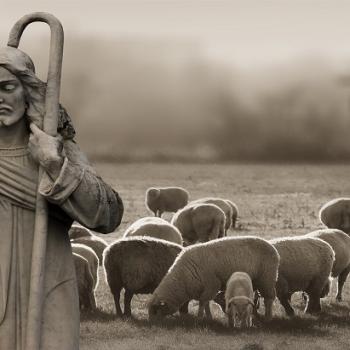“What is truth?”
John 18:38
Pontius Pilate was the Roman governor ruling over Judea during Jesus’ time, and the man who effectively signed His death warrant. Oddly enough, the Bible doesn’t portray Pilate as a malicious ruler intent on demonizing Jesus before His crucifixion. Instead, while the Bible doesn’t necessarily portray him in a sympathetic manner, it reveals that Pilate authorized the crucifixion with a great deal of reluctance on his part.
The Encounter
Just as Pilate prepared to come face to face with Jesus after His enemies delivered Him to the governor’s residence, Pilate’s wife sent a message to him about an anxious dream she’d had that morning. Although the Bible doesn’t detail her dream, Jesus Himself appeared in her dream, and whatever she saw, she knew that He was innocent and guilty of no crime.
“Besides, while he was sitting on the judgment seat, his wife sent word to him, ‘Have nothing to do with that righteous man, for I have suffered much because of him today in a dream.’
Matthew 27:19-20
With his wife’s warning in hand, already aware that something was amiss about the man being brought before him, Pilate went to first meet the accusers outside of his residence.
“Then they led Jesus from the house of Caiaphas to the governor’s headquarters. It was early morning. They themselves did not enter the governor’s headquarters, so that they would not be defiled, but could eat the Passover. So Pilate went outside to them and said, ‘What accusation do you bring against this man?’ They answered him, ‘If this man were not doing evil, we would not have delivered him over to you.’ Pilate said to them, ‘Take him yourselves and judge him by your own law.’ The Jews said to him, ‘It is not lawful for us to put anyone to death.’ This was to fulfill the word that Jesus had spoken to show by what kind of death he was going to die.”
John 18:28-32
Already, Pilate realized that Jesus was, indeed, an innocent man and that his accusers were maliciously desperate for a guiltless man to be executed.
With a supernatural warning in hand that the man before him was innocent, along with his insight that Jesus had committed no crime, Pilate was desperate to not have guiltless blood on his hands. As such, he was desperate for the responsibility of handling Jesus to be given to somebody else. For this reason, upon finding out that Jesus was a citizen of Galilee, which was under the jurisdiction of a man named Herod, Pilate sent Jesus to his colleague for judgment.
“And when he learned that he belonged to Herod’s jurisdiction, he sent him over to Herod, who was himself in Jerusalem at that time. When Herod saw Jesus, he was very glad, for he had long desired to see him, because he had heard about him, and he was hoping to see some sign done by him. So he questioned him at some length, but he made no answer. The chief priests and the scribes stood by, vehemently accusing him. And Herod with his soldiers treated him with contempt and mocked him. Then, arraying him in splendid clothing, he sent him back to Pilate. And Herod and Pilate became friends with each other that very day, for before this they had been at enmity with each other.”
Luke 23:7-12
Of note, Herod and Pilate had previously been enemies, but their united understanding of Jesus’ innocence made them forget their contempt for each other. Both rulers could see clear as day that Jesus had committed no crime, but alas, His accusers would not be swayed. Even when Pilate obeyed the Passover tradition of choosing a criminal to set free and offered the crowd of Jewish accusers the choice between Jesus and Barabbas, an infamous murderer, they had already made their choice.
“Now at the feast he used to release for them one prisoner for whom they asked. And among the rebels in prison, who had committed murder in the insurrection, there was a man called Barabbas. And the crowd came up and began to ask Pilate to do as he usually did for them. And he answered them, saying, ‘Do you want me to release for you the King of the Jews?’ For he perceived that it was out of envy that the chief priests had delivered him up. But the chief priests stirred up the crowd to have him release for them Barabbas instead. And Pilate again said to them, ‘Then what shall I do with the man you call the King of the Jews?’ And they cried out again, ‘Crucify him.’ And Pilate said to them, ‘Why? What evil has he done?’ But they shouted all the more, ‘Crucify him.’ So Pilate, wishing to satisfy the crowd, released for them Barabbas, and having scourged Jesus, he delivered him to be crucified.”
Mark 15:6-15
What follows in the Gospel of John similarly shows that ultimately, Pilate gave Jesus over to be crucified out of exasperation with His accusers’ relentless, bloodthirsty desire for Him to die.
“From then on Pilate sought to release him, but the Jews cried out, ‘If you release this man, you are not Caesar’s friend. Everyone who makes himself a king opposes Caesar.’ So when Pilate heard these words, he brought Jesus out and sat down on the judgment seat at a place called The Stone Pavement, and in Aramaic Gabbatha. Now it was the day of Preparation of the Passover. It was about the sixth hour. He said to the Jews, ‘Behold your King!’ They cried out, ‘Away with him, away with him, crucify him!’ Pilate said to them, ‘Shall I crucify your King?’ The chief priests answered, ‘We have no king but Caesar.’ So he delivered him over to them to be crucified.
So they took Jesus, and he went out, bearing his own cross, to the place called The Place of a Skull, which in Aramaic is called Golgotha. There they crucified him, and with him two others, one on either side, and Jesus between them. Pilate also wrote an inscription and put it on the cross. It read, ‘Jesus of Nazareth, the King of the Jews.’ Many of the Jews read this inscription, for the place where Jesus was crucified was near the city, and it was written in Aramaic, in Latin, and in Greek. So the chief priests of the Jews said to Pilate, ‘Do not write, ‘The King of the Jews,’ but rather, ‘This man said, I am King of the Jews.’” Pilate answered, ‘What I have written I have written.’”
John 19:12-22
On top of this, as the final symbol that he wanted nothing to do with the tragedy these accusers sought to create, Pilate washed his hands before the bloodthirsty crowd to show that he wished to wash his conscience clean of this bloodguilt.
“So when Pilate saw that he was gaining nothing, but rather that a riot was beginning, he took water and washed his hands before the crowd, saying, ‘I am innocent of this man’s blood; see to it yourselves.’”
Matthew 27:24
The Reluctant Judge
While Pilate was without a doubt an antagonist in the Passion, he was a reluctant one who tried numerous times to get the crowd of accusers to see reason. It is a testament to the Pharisees’ vile envy and hatred of Jesus that this time, the Roman leader acted with better morals than they, the supposed protectors of Jewish law.
Featured Image by Connor Brennan
Hello, and thank you for supporting my work here on Patheos! If you’d like to support me further, please feel free to “Buy Me A Coffee” here:
















